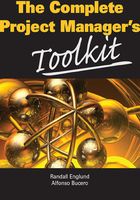
INTRODUCTION
Project Management Institute CEO Mark Langley writes, “It’s not enough for project and program managers to have technical skills. We need leadership, conflict resolution and negotiation skills. Organizations are telling us, ‘We’re looking for the next business leaders.’ And I say, ‘It’s about time’” (2011, p. 10).
While many professionals develop their craft through advanced education and on-the-job experiences, there comes a time when an enhanced skill set and a new perspective about working with people is necessary in order to advance to the next level of performance. How do you move beyond this plateau?
This Toolkit covers what it takes to be that next leader—a complete project manager. The goal is to integrate technical, people, and organization skills. The way to do this is to identify requisite skill sets and then learn from others about successful ways to develop and apply them. It is the integration of a spectrum of skills that enables certain individuals to make a difference and achieve more optimized outcomes. The ultimate aim is to develop a complete set of skills that is the right set to excel in today’s competitive environment.
Each chapter within The Complete Project Manager Toolkit provides a set of standalone tools regarding a skill that is important in becoming a complete project manager. Of course, the real value is in integrating and using as many of the tools as possible.
Throughout this and the core companion book, we emphasize the importance of the project manager’s having a positive attitude and how that approach helps organizations achieve project success. The key concept is that a variety of skills need to be integrated and applied in order to achieve optimized outcomes.
Use the molecule illustration in Figure I-1 to assess your skills in each of the twelve areas covered by this book. Initially rate yourself on a scale of one to seven, with a rating of one being very poor and seven very extraordinary. Do the assessment again after reading the book to validate your strengths and development opportunities and to reflect on your increased understanding from the journey through this material. Come back to the assessment periodically to monitor progress.

FIGURE I-1: Molecular Assessment
Much as the field of chemistry offers an ever-increasing understanding of molecular structure, a robust set of project, program, and portfolio management skills provides the leadership to fuse disparate groups into new organizations. These new organizations may come about through organic growth or mergers, or by leadership that opens the way to novel or innovative solutions or new markets. Developments in combining molecules into increasingly more dense and complex structures allow for more potent outcomes in small packages, such as in prescription medicines. Likewise, project managers who develop more robust skill sets also become more potent and produce more effective outcomes within their organizations.
Unlimited combinations are possible for the “molecules” that compose complete project managers. There are many ways to assemble successful outcomes based on additional skill sets. New possibilities will emerge as skills are combined in different ways. The profession of project, program, and portfolio management will truly benefit from new developments among the people inhabiting its space.

Drawing from nature’s bounty, the dragonfly provides apt symbology for the complete project manager. For our purposes, the dragonfly symbolizes change, specifically changes in perspective and self-realization. This kind of change comes from mental and emotional maturity and working toward understanding how people work together in organizations.
The dragonfly’s ability to scurry across water represents going beyond what’s on the surface, exploring deeper implications and aspects of life. It moves with the utmost simplicity, effectiveness, and power, as well as elegance and grace. It can see all 360 degrees around it, symbolizing being able to see beyond the mundane and capture a wider picture of reality (Dragonfly Site n.d.).
This Toolkit opens doors by sharing the means to advance the efficacy of individual, team, and organizational performance. Infinite skill combinations are possible for the complete project manager. Achieving completeness is an unending journey. So let’s get started…